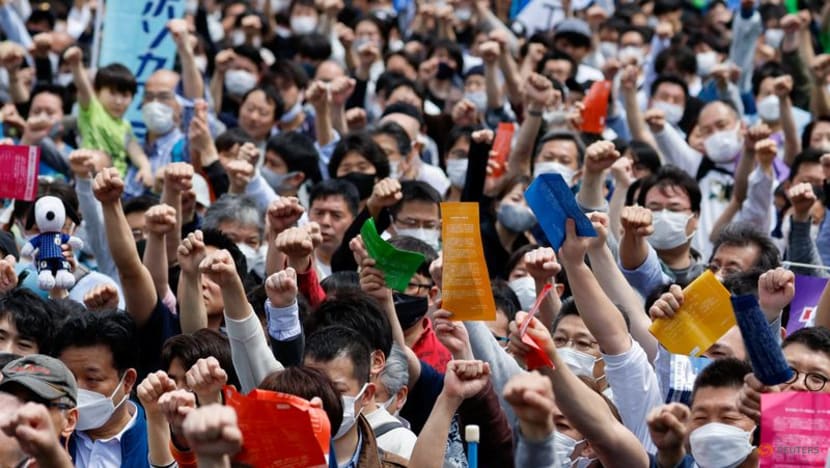Japan's largest union group sees biggest wage hike demand in over 30 years

FILE PHOTO: Members of the Japanese Trade Union Confederation, commonly known as Rengo, raise their fists as they shout Gambaro and cheer during their annual May Day rally to demand higher pay and better working conditions, in Tokyo, Japan April 29, 2023. REUTERS/Issei Kato/File Photo
TOKYO :Japan's largest labour union umbrella group is seeing its member unions demand the biggest salary increase in over 30 years as both the government and central bank look for signs of sustainable wage growth to drive the economy.
Rengo, which has about 7 million members, said on Thursday its survey found member unions were seeking an average wage hike of 6.09 per cent for this year, the first time in 32 years that they have asked for more than 6 per cent.
Its demand could mean another year of sizeable wage increases to be agreed in annual talks between unions and employers, which Prime Minister Shigeru Ishiba sees as key to Japan's economic progress. Last year, Japanese companies agreed to an average 5.1 per cent wage hike following a 3.5 per cent rise in 2023.
Broad-based pay increases are also a prerequisite for the Bank of Japan to continue monetary policy normalisation. The central bank only last year ended a decade of massive monetary stimulus and in January raised its short-term interest rate to the highest level since 2008.
The union's demand provides validation for the BOJ, which sees wage-fuelled inflation as the basic rationale for nudging rates higher, Barclays analysts wrote in a research note.
A majority of economists polled by Reuters expect the BOJ to hike rates once more this year, most likely during the third quarter.
The prospects of a further increase in borrowing costs strengthened the yen to below 148 per dollar after the union's survey results were announced.
It includes an average 4.51 per cent increase in the base pay, which excludes the seniority-based automatic annual increase, and exceeds the union's 2025 minimum wage growth target of least 5 per cent, including base pay rise of at least 3 per cent.
Rengo's member unions had sought an average 5.85 per cent increase around this time last year.
The group this year is focused narrowing the income gap that separates workers at smaller firms and those at large companies.
The average wage hike sought by unions with less than 300 members stands at 6.57 per cent, the largest since 1994.
Smaller firms are already spending far more of their profits on wages than their bigger counterparts and could struggle to keep hiking pay.
Annual wage talks between management and labour unions typically conclude around mid-March at major firms, with agreed pay increases going into effect a few months later.













